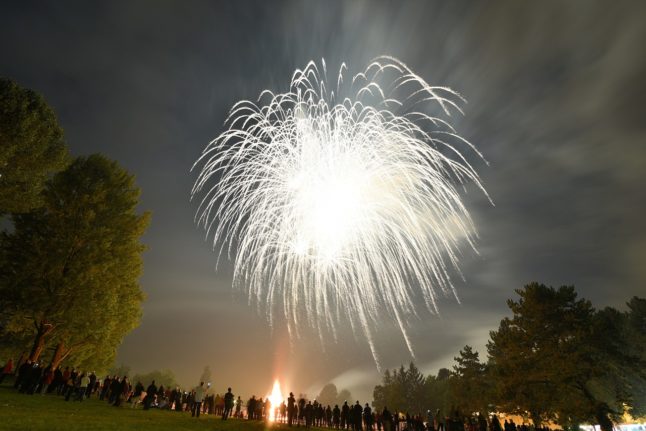In Switzerland, public holidays and the days that are treated as public holidays (with the exception of August 1st), are set by the cantons.
Only a few public holidays will give everyone a day off work throughout Switzerland.
Here are the public holidays for 2024, including where and why some Swiss celebrations are observed.
National Holidays
January 1st, Monday – New Year’s Day
August 1st, Thursday – Swiss National Day, Switzerland’s only national public holiday, commemorates the founding of the Swiss Confederation.
May 9th, Thursday – Ascension day
Ascension day is synonymous with the German and Austrian holiday Christi Himmelfahrt and commemorates Jesus’s ascension to heaven. Find out more about how (and where) it is celebrated in Switzerland in The Local’s article on the topic.
December 25th, Wednesday – Christmas Day
Cantonal Holidays
January
January 2nd, Tuesday – Berchtold’s Day (celebrated in Aargau, Bern, Fribourg, Glarus, Jura, Lucerne, Neuchâtel, Obwalden, Schaffhausen, Thurgau, Vaud, Zug, and Zurich)
January 6th, Saturday – Three King’s Day (Ephiphany)
According to Western belief, Epiphany refers to the three wise men from the who were led to Jesus by the Star of Bethlehem and historians assume that the Epiphany festival, or Dreikönigstag, has existed in Switzerland since 1311.
READ MORE: Dreikönigstag: How does Switzerland celebrate ‘Three Kings Day’
March
March 1st, Friday – Republic Day
Republic Day – a Swiss regional public holiday – is marked each year on March 1st in Neuchâtel when the canton celebrates becoming a republic within the Swiss Confederation.
March 19th, Tuesday – St Joseph’s Day (marked in Graubünden, Lucerne, Nidwalden, Schwyz, Solothurn, Ticino, Uri, and Valais)
March 29th, Friday – Good Friday (National, except Ticino and Valais)
April
April 1st, Monday – Easter Monday (National, except Neuchatel, Solothurn, Valais, Zug)
April 4th, Thursday – Näfels Ride (celebrated in Glarus)
April 15th, Saturday – Sechseläuten (celebrated in Zurich)
May
May 1st, Wednesday – Labour Day (International Workers’ Day)
Though people in Zurich, Basel–Stadt, Basel–Land, Jura, Neuchâtel, Schaffhausen, Thurgau and Ticino are granted a full day off work, in Aargau and Solothurn, workers are usually only given a half day off (from 12noon).
In some cantons, such as Freiburg and St. Gallen, a half day is usually given to cantonal workers on Labour Day.
May 20th, Monday – Whit Monday (every canton, except Valais)
May 30th, Thursday – Corpus Christi (celebrated in Aargau, Lucerne, Uri, Schwyz, Obwalden, Nidwalden, Zug, Fribourg, Solothurn, Appenzell Innerrhoden, Ticino, Valais, and Jura)
June
June 23rd, Sunday – Jura Independence Day
June 29th, Saturday – Feast of Saints Peter and Paul (celebrated in Ticino)
August
August 15th, Thursday – Assumption Day (holiday in Lucerne, Obwalden, Nidwalden, Schwyz, Ticino, Uri, Valais and Zug. And it is a holiday in some municipalities in Aargau, Basel-Country, Freiburg, Graubündern, and Soluthurn)
September
September 5th, Thursday – Jeûne genevois (Geneva Thanksgiving)
September 9th, Monday – Knabenschiessen (Traditional shooting competition held only in Zurich)
September 15th, Sunday – Swiss Federal Feast (National, except Geneva and Zug)
September 16th, Monday – Lundi du Jeûne federal (Federal Day of Thanksgiving, Repentance and Prayer in Vaud)
September 25th, Wednesday – Saint Nicholas of Flüe Day (celebration of the patron saint of Switzerland in Obwalden)
November
November 1st, Friday – All Saints’ Day
Those who work in the cantons of Appenzell Innerrhoden, Fribourg, Glarus, Jura, Lucerne, Obwalden, Nidwalden, St. Gallen, Schwyz, Ticino, Uri, Valais, and Zug will get to enjoy an entire day off work.
Those working in other regions may still be entitled to a half-day off. Read on here to find out where in Switzerland that is the case.
December
December 8th, Sunday – Immaculate Conception Day (celebrated in Aargau, Appenzell Innerrhoden, Fribourg, Graubünden, Lucerne, Nidwalden, Obwalden, Solothurn, Schwyz, Ticino, Uri, Vaud, and Zug)
December 26th, Thursday – St Stephen’s Day (National, except Geneva, Jura, Valais, and Vaud).
December 31st, Tuesday – Restoration Day (celebrated in Geneva)



 Please whitelist us to continue reading.
Please whitelist us to continue reading.
Member comments